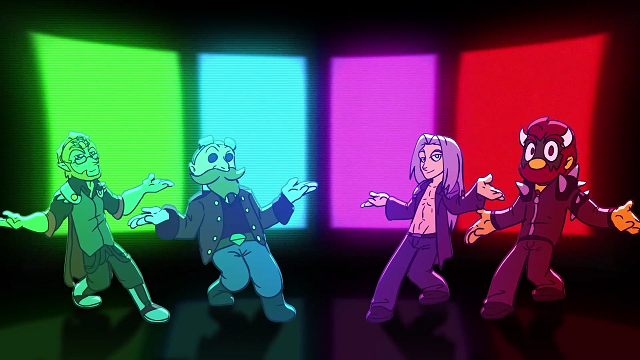A screenshot of the video for “I’m the Boss”
By Kevin Matyi
Copy Editor
Big Bad Bosses, a new “video game villain boy band featuring the most evil villains in the gaming universe,” according to the official website, released its debut album, “Power Overwhelming,” on Dec. 22, 2015.
The album’s music and lyrics were written by Jake Kaufman, a video game composer known for his work on games including “Shovel Knight” and “Contra 4.”
The main singers of the boy band are Jirard “The Completionist” Khalil, Alex “National Dex” Faciane, Nathan “Nate Wants To Battle” Sharp and Satchel “Satch Bags” Drakes.
Respectively, they portray Bowser, or “Big Bow,” from the Mario series, Professor Robotnik, “Ronik,” from the Sonic series, Sephiroth, or “Sephy,” from Final Fantasy VII, and “G-Ca$h,” Ganondorf from the Legend of Zelda series.
Of the album’s 15 tracks, one is a re-edited version of another song to make it suitable for radio, and four, “Intro,” “Racing,” “Questions” and “Office,” are spoken sketches leading in to the following song. The first track, “Intro,” is a spoken introduction from Arin “Egoraptor” Hanson to the album as a whole.
The first full song of the album is “I’m The Boss,” which, as of Dec. 23, 2015, is the only song to currently be officially available for streaming outside of bandcamp via Khalil’s YouTube channel, “That One Video Gamer.”
The song shows almost immediately that the group was genuine in saying that they were making a boy band of video game villains. The chorus is catchy, while the rest of the song give the characters time to show their own styles.
The follow up song, “Princess,” shows that the album has significant range. The tone shifts from upbeat and proud to a ballad as the villains try to serenade the princesses of their various series. It showcases the higher range of the singers while also showing different harmonies and a different musical style than “I’m The Boss.”
The next song, “Eggman,” is the first of the songs that are specific to one of the characters of the band, this one being dedicated to Faciane’s character, Ronik. The lyrics of the song focus on cooking, especially eggs, and people’s perception of the character. The mood also changes again, and becomes more of a salsa instead of a pop song.
Sharp’s character, Sephy, has the next specific song, with “Angel.” The song starts with a strong beat as the character sees a woman in a club that he is attracted to. Then the chorus of the song starts, and while the club beat continues, the rest of the song becomes like Sephiroth’s theme from Final Fantasy VII by adding in a full orchestra and a choir singing in Latin. The combination somehow works very well, and the song as a whole is very enjoyable, potentially the best of the album.
“Capture You,” like “Princess,” is about the villains’ interaction with the princesses in their respective series. The difference is that “Capture You” focuses specifically on the kidnapping part as opposed to their feelings in general. However, it is still a slower song showing for a second time that the villains want a loving relationship, not just a prisoner.
“The Raid” is one of the two songs of the album that may not be worth buying on its own. It is Khalil, or Big-Bow’s, specific song. It is a rave song, and clearly is designed to be best heard at a loud volume with many people singing alone. Much like “The Happy Birthday Song,” the more people are singing it together, the better it sounds. When only a few people are singing, the individual voices clash and the dissonance becomes more apparent.
“Bears and Birds,” is the second song of the album that may be skippable. It pays homage to the games that Grant Kirkhope is known for, namely the Banjo-Kazooie series, and it features Kirkhope himself as a guest singer, but the song becomes heavily distorted when Kirkhope begins rapping.
“Minions” is an interesting take on the villains’ perspective. The various villains are compassionate and wish for their minions to be safe, while wishing that those who have died to go to heaven. It also gives the perspective of the minions by having the second cameo of the album, from Dale North, essentially saying that as they go in to battle for their boss, they are waiting in line to die.
“Office” is the final spoken track of the album. In it, the singers start relaxing and congratulate each other on finishing the album. Then they realize that they still need to have all of the other cameo appearances that they promised. Thus, they decide to have one big Broadway-style, show-stopping number to finish the album and include everyone they meant to put in the rest of the album.
The big number is “Another Villain,” showing that even the heroes are causing massive damage and death as a result of their actions. Without a video to follow, it is difficult to say exactly which characters are in the song, or even how many there are in total, but there are at least six guest voices present in addition to the main four.
All in all, “Power Overwhelming” is generally a good album, especially for a first album from Big Bad Bosses.
Not every song is a hit, but all are at least interesting to listen to. If you are a gamer, then you will understand more of the references, but the majority of the time, even a passing knowledge of video games will let you understand what the lyrics generally mean.


